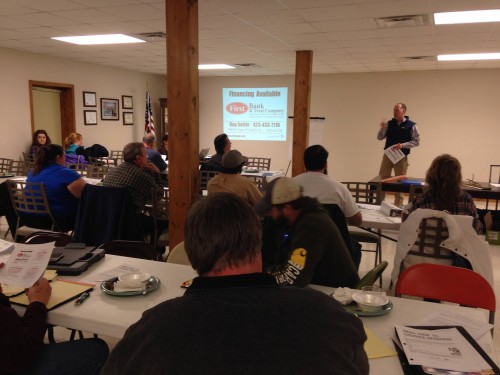 Field School Session 4
Field School Session 4
Navigating Farm Resources—Neighbors, Conservation, and Financial Support
The Appalachian RC&D Field School for farmers-in-training met this past Thursday, February 18 for the fourth session. With a theme of “Resources/ Neighbors,” this session brought together a total of seven presenters on various topics related to local, state, and federal programs that assist with loans, grants, conservation, advisement, and education.
To begin the night, attendees were offered delicious warm soup, breads, and salad— all of which were prepared locally by the Boone Street Market in Jonesborough, a market that supports local farmers. The first presentation was a brief welcome from the Farm Bureau, which is allowing us to use their classroom, and a message of how Farm Bureau advocates for farmers at the state legislature. Following this, Tim Smithson, manager of the Washington Farmers Cooperative, spoke with participants about coop membership. After his sharing, Roy Settle from First Bank & Trust delved into “the 5 C’s of credit” that is reviewed when a farmer applies for a loan: character, capacity, capital, collateral, and conditions— conditions such as whether or not a farmer is raising a crop or animal that has a market.
Connie Sharp, from the Washington County UT Extension Service, spoke next. She presented attendees with programs and educational services they could register to be involved with, from “Canning College” with Elizabeth Elizondo to 4-H opportunities for children, which sparked curiosity and interest in the room.
Louis Buck, with the Tennessee Department of Agriculture, shared important pieces about the Tennessee Agricultural Enhancement Program (TAEP). TAEP is a program that supports farmers through cost-share assistance on long-term investments to enhance the farm. Traditionally most funding has gone towards developing beef herds, or infrastructure to support livestock. TAEP also has Diversification funds “to encourage agricultural producers to expand or improve their working farm/existing operation through the production of diversified agricultural products: Agritourism, Fruits & Vegetable, Honey Bee, Horticulture, Organic, and Value-Added Products”. For example, a farmer could apply for financial support for a greenhouse, cold storage, irrigation, and fruit stock, and if approved, upon completion would be reimbursed the agreed-upon amount for costs accrued throughout its construction. Buck encouraged interested growers to get in contact with the department for advice on good applications, which will be due June 1-7, 2016, for the Diversification grants. TAEP application categories of available support can be found here.
Matthew Christian, a representative from the USDA Farm Services Agency, stepped up next. He explained their role as one providing support in particular “for those producers who are unsuccessful in obtaining that private credit….we come in from the federal level,” and they do not operate off of credit score, expanding opportunity. They are unique, in that their support is in place not for large corporate farm operations, but “family farmers and ranchers.” He spent much of the time highlighting the opportunities of microloans, pointing out that “Microloans have just happened and they are a great opportunity for beginning farmers.” FSA loans have typically required 3 years of farm management experience, but Microloans are unique in that they can provide as much as $50,000 to qualified producers who have had no agricultural experience but are working with a mentor farmer. More information for farmers can be found here.
Greg Quillen of the USDA Natural Resources Conservation field office in Jonesborough, opened his lesson by sharing USDA statistics, nesting participants in national context. He shared that there are 2.07 million farms in the nation, which is a number down 1% from last year. “We come in to conserve, maintain, or improve the natural resources” on farmer’s lands. He eagerly offered their services, providing his direct contact, saying, “We want to come out to your farm and just talk to you. We want to protect what’s there.” He added that every program is voluntary.
Following Quillen, Dana York stepped up to close the sessions out for the night— though not before sharing some important details on soil testing. She encouraged participants to take soil test boxes home with them to be filled and then dropped off with their local UT Extension Office. The soil is then tested to provide farmers with a soil report, detailing current soil nutrients and deficiencies. She let participants know that Appalachian RC&D will compensate two soil test boxes per farm— not the typical “goody box” given away, but the perfect one for a room full of farmers.